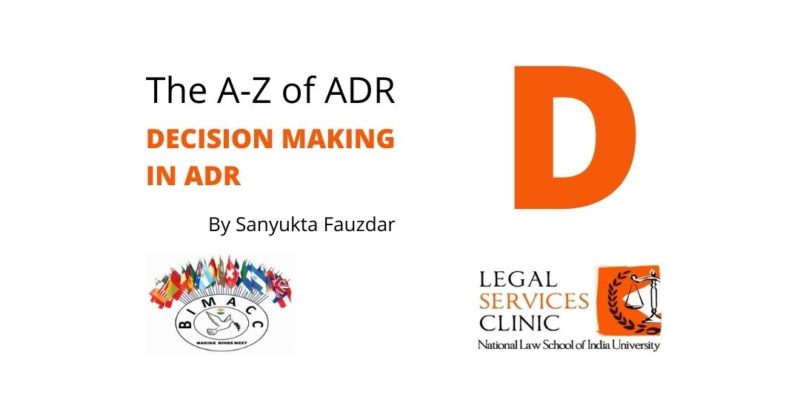
A-Z of ADR: Decision Making in ADR
– Sanyukta Fauzdar (II Year, NLSIU Bangalore)
All ADR processes are geared towards the goal of dispute resolution, conflict management, and amicable settlement. Decision-making plays an important role in the achievement of these goals, and ADR mechanisms vary greatly in their placement and formality of decision-making power. Differences can most prominently be observed along lines of party involvement and autonomy. Arbitration is more of an adversarial and adjudicatory process than both conciliation and mediation. Further, statutory grounding and the availability of grounds for appeal provide greater clarity to this vesting of power.
Arbitration
The process of arbitration is adversarial wherein both parties have the opportunity to submit evidence and plead their cases. An independent and neutral arbitrator acts as the adjudicator of the dispute, and their award is final and binding upon both parties. The selection of the arbitrator is subject to the parties’ consent and is typically made based upon the professional’s substantive experience. The Arbitration and Conciliation Act 1996 governs domestic arbitration in India, and Section 29 of the aforementioned Act deals with decision-making by the panel of arbitrators.[1] In proceedings that involve multiple arbitrators, any decision of the tribunal must be made by a majority of its members. Decision-making is squarely vested with the tribunal, and the role of the parties is extremely limited in this sphere. The arbitral award is not subject to appeal except on specific grounds laid down in Section 34.[2]
Conciliation
The Arbitration and Conciliation Act, in Part III, recognizes conciliation as a distinct form of ADR process. The scope of a neutral person’s role in the conciliation process is two-fold: facilitative and evaluative. The neutral can both help the parties explore a wide array of options and propose potential solutions. The Conciliator is bound by standards of evidence and procedure stipulated in the Act, and guided by principles of objectivity, fairness and justice.[3] The Conciliator must make proposals for settlement, and in this regard, their role is broader than that of a Mediator’s. However, parties are not bound to accept these suggestions. The decision-making power vests solely with the parties. The process is non-adjudicatory in nature, and the Conciliator does not have the power to decide the dispute. Any settlement agreed upon is treated like an arbitral award and is final and binding.[4]
Mediation
The mediation process seeks to facilitate agreement and resolve disputes with the assistance of a neutral third-party mediator. The decision-making power, however, resides solely with the participating parties. The mediator plays a very limited role that does not include the adjudication or settlement of disputes. The mediator aims to gather background information and appraise themselves of claims and defences. The primary function of the mediator is to manage interaction and uncover the underlying interests of parties. They cannot extend suggestions to the parties and must restrict themselves to the role of a facilitator.
Given that there exists no specific legislation that provides a framework for mediation, institutional rules govern the conduct of the process. Under the BIMACC Mediation Rules,[5] if parties so desire, the settlement agreed upon can be drawn as a decree under either the Legal Services Authorities Act 1987[6] or the Arbitration and Conciliation Act 1996.[7] This settlement is both binding and non-appealable.
[1] Arbitration and Conciliation Act 1996, s 29.
[2] Arbitration and Conciliation Act 1996, s 34.
[3] Arbitration and Conciliation Act 1996, s 67.
[4] Arbitration and Conciliation Act 1996, s 73.
[5] Bangalore International Mediation, Arbitration, and Conciliation Centre Mediation Rules, 24.02.
[6] Legal Services Authorities Act 1987, s 22.
[7] Arbitration and Conciliation Act 1996.
– Sanyukta Fauzdar (II Year, NLSIU Bangalore)
Sanyukta Fauzdar is a second-year student from the National Law School of India University (NLSIU), Bangalore.
BIMACC expresses its gratitude towards the author and to the members of the Legal Services Clinic, National Law School of India University (NLSIU) for their support in our collaborative efforts to promote ADR with this series titled “A-Z of ADR”. The purpose of this series is to increase the understanding of certain fundamental concepts of Alternative Dispute Resolution.
The Legal Services Clinic is a student-run committee that provides free legal services to the socially and the economically backward sections of the society who have difficulty accessing the judicial system. It also has a mandate of spreading legal awareness and providing free legal assistance to those who cannot afford it.
Website: www.legalservicesclinic.org/
Facebook: @legalservicesclinic
Email: lsc.nlsiu@gmail.com
Phone Number: 073586 73214
Disclaimer: The views and opinions expressed in this blog are those of the author and do not necessarily reflect the official policy or position of BIMACC, any of the members of the Board, or the empanelled neutrals. This blog is for informative purpose only and does not constitute legal advice in any manner whatsoever.
